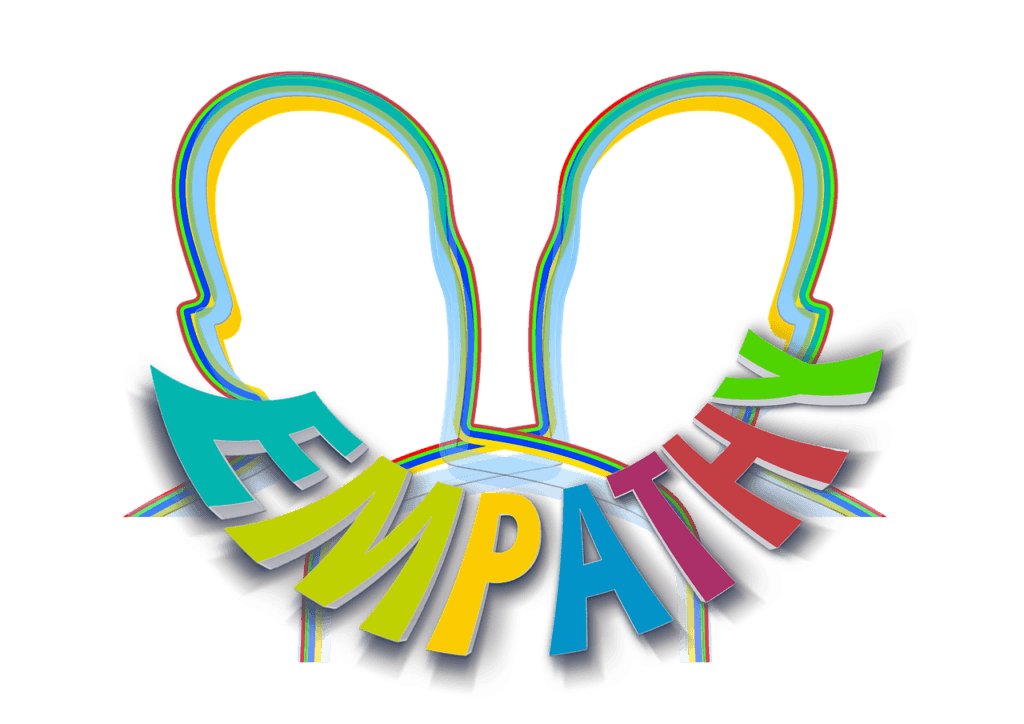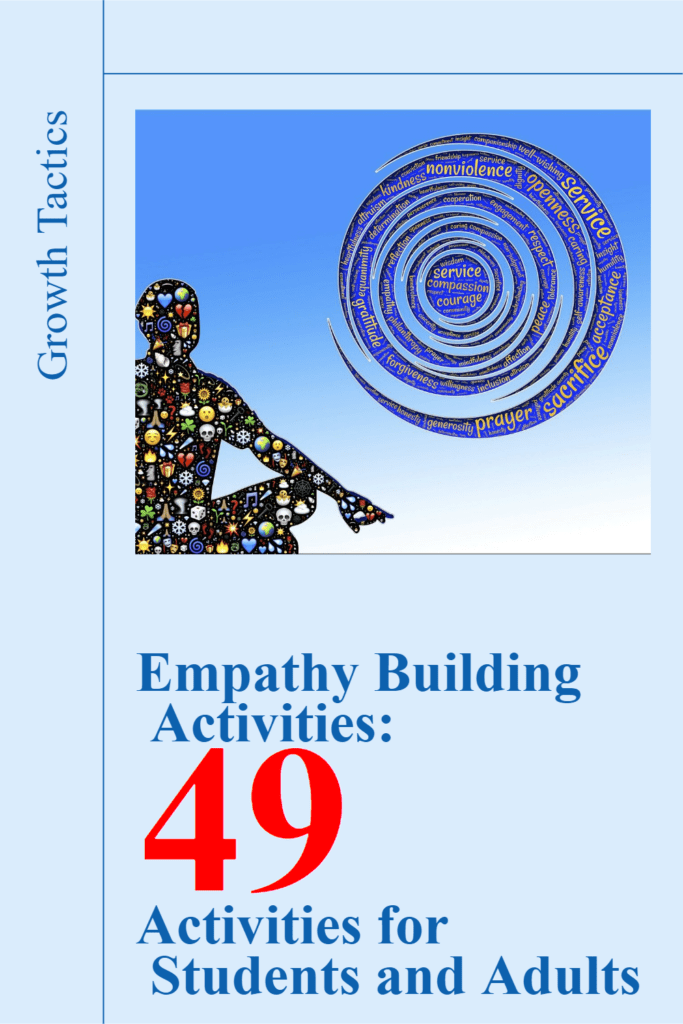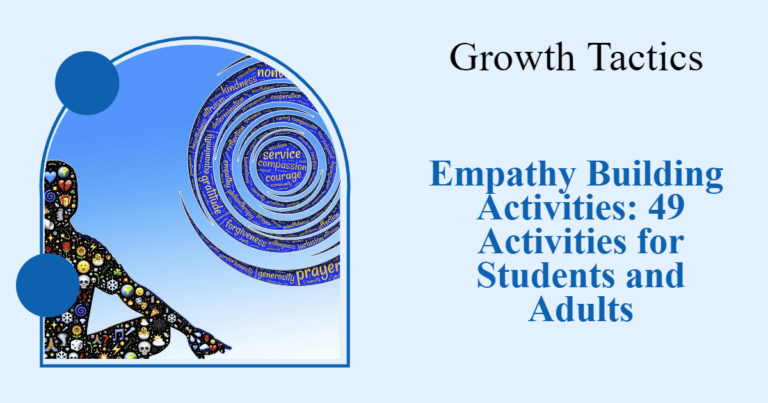Empathy is the ability to understand and share the thoughts and feelings of others. It is an important skill that can greatly benefit both children and adults. Building empathy can help improve social skills, foster kindness, and encourage a greater understanding of others. In this blog post, we will explore 49 empathy building activities that are suitable for students and adults alike.
Jump To Section
What is Empathy?
Before we dive into the activities, let’s first understand what empathy is. Empathy is the ability to understand and share the thoughts and feelings of others. It involves putting yourself in someone else’s shoes and seeing the world from their perspective. Empathy allows us to connect with others on a deeper level and build stronger relationships.
Why is Empathy Important?
Empathy is an essential skill for building positive relationships and fostering kindness. When we are able to empathize with others, we are more likely to show empathy and kindness towards them. This can help create a more supportive and inclusive environment, both at school and in our personal lives. Additionally, empathy can improve our communication skills and help us resolve conflicts more effectively.
Empathy Building Activities and Exercises

1. Random Acts of Kindness
Encourage individuals to perform gestures of kindness towards others without specific intention or expectation. This can involve actions like holding doors, complimenting others, or offering assistance. Random acts of kindness help promote empathy by cultivating a habit of considering and meeting the needs of others.
2. Perspective Taking
Promote empathy by asking individuals to put themselves in someone else’s shoes and consider their thoughts, feelings, and experiences. This activity encourages individuals to broaden their perspective and understand varying viewpoints, fostering empathy and understanding.
3. Facial Expressions Activity
Engage in exercises that focus on recognizing and interpreting different facial expressions to understand the emotions someone may be experiencing. By becoming more attentive to facial cues, individuals can develop better empathy skills, enhancing their ability to respond empathetically to others.
4. Writing Letters of Appreciation

Encourage individuals to write letters expressing gratitude and appreciation to someone who has positively impacted their lives. This activity helps individuals cultivate empathy by putting themselves in someone else’s shoes and acknowledging the impact of kindness and support.
5. Role-Playing
Engage in role-playing scenarios where individuals take on different perspectives and act out how they would respond in specific situations. This activity allows individuals to practice empathy by considering different viewpoints, fostering understanding and compassion.
6. Discussing Emotions
Create a safe space for individuals to openly discuss and share their emotions. By promoting open dialogue about feelings and experiences, this activity helps build empathy by encouraging individuals to listen, understand, and support one another.
7. Mindfulness Exercises
Practice mindfulness exercises that focus on being present, observing one’s own thoughts and emotions, and developing self-awareness. These exercises can enhance empathy by increasing individuals’ ability to understand and connect with their own emotions, leading to a better understanding of others.
8. Volunteering in the Community

Engage in community service projects or volunteer work that allows individuals to actively contribute and make a positive difference in other people’s lives. Volunteering helps individuals develop empathy by immersing them in different situations and nurturing a sense of compassion for those in need.
9. Hosting a Charity Event
Organize an event to raise funds and awareness for a cause, providing opportunities for individuals to contribute to a larger cause and understand the needs of others. Hosting a charity event can foster empathy by encouraging individuals to come together and support a common goal, promoting empathy and compassion for those being helped.
10. Participating in a Compassion Meditation
Engage in guided or self-directed meditation practices that focus on cultivating compassion and empathy towards oneself and others. Compassion meditation can help individuals develop a deeper understanding and empathy for the emotions and struggles of others.
11. Reading Non-Fiction Books about People from Different Backgrounds
Explore literature that tells the real-life stories and experiences of individuals from diverse backgrounds. Reading non-fiction books can expand individuals’ perspectives and deepen their empathy by providing insights into the challenges and triumphs of others.
12. Having a Cultural Potluck or Sharing Traditions
Organize an event where individuals can share and celebrate their cultural heritage, traditions, and cuisines. This activity promotes empathy by encouraging participants to appreciate and respect different cultures and gain a better understanding of the experiences and values of others.
13. Partnering with a Pen Pal from Another Country
Connect with someone from a different country or culture through pen pal exchanges. This activity allows individuals to develop empathy by learning about each other’s lives, traditions, and perspectives, fostering cross-cultural understanding and empathy.
14. Empathy Walk

Organize a group walk in a local community or nature setting, and encourage participants to observe, reflect, and discuss their surroundings and the experiences of others they encounter. An empathy walk can help individuals develop empathy by promoting awareness and a deeper connection with the people and environments around them.
15. Watching Documentaries on Social Issues
Watch documentaries that shed light on social justice and inequality issues. Documentaries offer insights into different perspectives and experiences, fostering empathy by encouraging individuals to understand social issues through various lenses.
16. Creative Writing Prompts about Empathy
Engage individuals in writing exercises that encourage them to explore different scenarios and perspectives related to empathy. Creative writing prompts can help individuals develop a deeper understanding of others’ emotions and experiences, nurturing empathy and compassion.
17. Creating a Kindness Jar
Designate a jar where individuals can write and share acts of kindness done for them or witnessed. This activity helps individuals focus on and appreciate the kindness of others, building empathy and encouraging a culture of compassion and gratitude.
18 Active Listening Exercises
Engage in activities that promote active listening skills, such as practicing reflective listening or holding structured conversations. Active listening exercises help individuals become more attentive to others’ needs, emotions, and perspectives, fostering empathy in their interactions.
19. Holding a Mock Trial or Debate

Organize a mock trial or debate where individuals take on different roles and argue different perspectives. This activity encourages participants to understand and consider opposing viewpoints, fostering empathy by challenging assumptions and promoting open-mindedness.
20. Organizing a Community Service Project
Gather a group of individuals to plan and execute a community service project that aims to address a specific need or issue in your local area. This activity fosters empathy by promoting active engagement and understanding of the challenges faced by others, while also providing an opportunity to make a positive impact.
21. Reducing Negative Self-Talk
Engage in exercises and techniques to recognize and challenge negative self-talk. By promoting self-compassion and developing a more positive internal dialogue, this activity can enhance empathy by encouraging individuals to approach themselves and others with kindness and understanding.
22. Joining a Social Club
Become a member of a social club or organization that aligns with your interests or passions. Being part of a community of like-minded individuals provides opportunities to develop empathy by building relationships, understanding diverse perspectives, and collaborating on shared goals.
23. Performing in a Theater Production or Role Play
Participate in theater productions or role-play activities that require individuals to portray characters with different experiences, emotions, and perspectives. This activity fosters empathy by immersing individuals in the lives of others, enhancing their understanding and compassion.
24. Empathy Map Activity
Engage in empathy mapping exercises where individuals visualize and analyze the needs, thoughts, emotions, and experiences of others. This activity fosters empathy by encouraging individuals to actively consider multiple perspectives and develop a deeper understanding of others’ feelings and needs.
25. Active Reading and Writing about Diverse Perspectives

Read books, articles, and other written materials that showcase diverse perspectives and experiences. Engage in reflective writing exercises to process and express empathy towards the characters or authors, deepening understanding and cultivating empathy.
26. Group Counseling Sessions with a School Counselor
Participate in group counseling sessions led by a school counselor or mental health professional. These sessions provide a safe space for individuals to share their experiences, emotions, and challenges, fostering empathy by encouraging active listening, understanding, and support among participants.
27. Journaling about Empathy
Engage in regular journaling exercises focused specifically on empathy. By reflecting on their own experiences and interactions, individuals can develop a greater understanding of empathy and its importance in their lives and relationships.
28. Board Games that Encourage Empathy and Cooperation
Play board games that emphasize teamwork, cooperation, and empathy. These games provide opportunities for participants to collaborate, communicate, and consider the perspectives and needs of others, fostering empathy and strengthening interpersonal skills.
29. Using Empathy-Themed Conversation Starters
Engage in conversations with others using empathy-themed conversation starters. These prompts encourage individuals to discuss emotions, experiences, and perspectives in a supportive and empathetic manner, deepening connections and understanding.
30. Learning about Different Religions and Beliefs
Take the time to study and understand various religions and belief systems that are different from your own. This activity promotes empathy by fostering a deeper understanding and appreciation of diverse perspectives and religious practices.
31. Outdoor Team-Building Activities

Engage in team-building activities that take place outdoors, such as ropes courses, hiking, or sports. These activities encourage individuals to work together, communicate effectively, and develop empathy by understanding and supporting their teammates’ strengths and challenges.
32. Volunteer at a Nursing Home or Hospice
Volunteer your time at a nursing home or hospice facility to support and engage with elderly or terminally ill individuals. This hands-on activity promotes empathy by providing an opportunity to connect with people facing different life circumstances and actively contribute to their well-being.
33. Role Reversal Activity
Engage in a role reversal exercise where individuals take on the perspective and experiences of someone different from themselves. This activity promotes empathy by allowing individuals to step into someone else’s shoes and gain a deeper understanding of their struggles and emotions.
34. Empathy Interviews with Family and Friends
Conduct empathy interviews with family members or friends, asking open-ended questions about their experiences, feelings, and challenges. This activity promotes empathy by fostering empathetic listening skills and deepening understanding of others’ perspectives.
35. Mindful Listening Exercises
Participate in mindful listening exercises where individuals practice giving their full attention to a speaker without interruption or judgment. This activity enhances empathy by allowing individuals to fully understand and appreciate the thoughts, emotions, and experiences being shared.
36. Emotion-Focused Drawing or Painting
Engage in art-focused activities, such as drawing or painting, that emphasize expressing and exploring different emotions. This activity encourages empathy by providing a creative outlet to reflect on and better understand the emotions experienced by oneself and others.
37. Gratitude Journals

Keep a gratitude journal and write down things you are grateful for each day. This activity cultivates empathy by fostering a positive mindset and encouraging individuals to appreciate and empathize with the experiences, kindness, and support they receive from others.
38. Walking in Someone Else’s Shoes Challenge
Participate in a challenge where individuals spend a designated amount of time adopting the lifestyle and routines of someone different from themselves. This activity promotes empathy by immersing individuals in the experiences of others, fostering understanding and compassion.
39. Active Reflection on Our Personal Biases
Engage in regular reflection and self-examination to identify personal biases and prejudices. This activity promotes empathy by encouraging individuals to challenge their own assumptions, expand their perspectives, and strive for greater understanding and acceptance of others.
40. Participating in a Protest or March
Engage in a peaceful protest or march to advocate for social justice or raise awareness about important issues. This activity promotes empathy by coming together with others to support a cause and demonstrate solidarity with individuals who are marginalized or facing injustice.
41. Creating a Public Art Installation that Promotes Empathy
Collaborate on a public art installation that aims to evoke empathy and understanding among viewers. Through visual or interactive art, this activity encourages individuals to reflect on diverse perspectives, emotions, and experiences, fostering a sense of connection and compassion.
42. Storytelling about Personal Struggles and Challenges
Share personal stories of struggles and challenges with others in a safe and supportive environment. This activity promotes empathy by creating a space for individuals to listen, empathize, and learn from each other’s experiences, fostering understanding and connection.
43. Therapy Sessions that Focus on Empathy Skills
Participate in therapy sessions that specifically focus on developing empathy skills and emotional intelligence. Through guided exercises and discussions, individuals can enhance their ability to understand and empathize with others, leading to healthier relationships and improved communication.
44. Building Empathy into the Curriculum Across Subjects
Integrate empathy-building activities and discussions into various academic subjects and educational curricula. By incorporating empathy as a core value, this activity promotes a culture of understanding, compassion, and kindness among students and educators.
45. Sharing Stories of Struggle and Triumph
Create opportunities for individuals to share stories of both struggle and triumph in their lives. This activity promotes empathy by highlighting the resilience, courage, and vulnerabilities of others, fostering connections based on shared human experiences.
46. Reflecting on Personal Experiences of Exclusion or Feeling Different
Encourage individuals to reflect on moments when they have felt excluded or different from others. This introspective activity promotes empathy by deepening understanding of the impact of social dynamics and fostering compassion toward those who may face similar challenges.
47. Hosting a Cultural Exhibition
Organize a cultural exhibition or event that celebrates diverse traditions, heritage, and identities. This activity promotes empathy by showcasing and appreciating the richness of different cultures, fostering mutual respect, understanding, and unity.
48. Peer Counseling on Empathy Building
Establish peer counseling programs where individuals can support each other in developing empathy skills and emotional awareness. This activity promotes empathy by providing a safe space for empathetic listening, sharing experiences, and offering support and guidance.
49. Virtual or In-Person Empathy Workshops
Participate in empathy workshops that offer a combination of virtual or in-person sessions focused on developing empathy skills and enhancing emotional intelligence. These workshops provide practical strategies, tools, and exercises to promote empathy in personal and professional interactions. These are great for individuals or teams in the workplace.
Conclusion
In conclusion, the above list showcases a variety of empathy-building activities that can be beneficial for both students and adults. By engaging in these exercises, individuals can develop a deeper understanding of different perspectives, enhance their ability to empathize with others, and cultivate a more compassionate and inclusive mindset. Whether through volunteering, artistic expression, storytelling, or self-reflection, these activities offer opportunities to foster empathy, promote social connection, and contribute to a more empathetic and understanding society.


